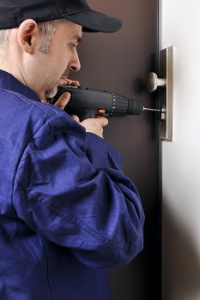Locksmith scams are surprisingly common in the United States. Typically, the scammers target homeowners and auto owners when they are at their most desperate point, when they have been locked out of their home or car, are in a real emergency and require immediate help.
 The reason locksmith scams happen so often is that homeowners or auto owners usually do a quick search on their phone after getting locked out and call the locksmith service that appears most prominently in online directories or search results, without really knowing anything about it. Many scammers use advanced SEO techniques to game Google’s SERPs or online directories and they do so by copying legitimate locksmith services.
The reason locksmith scams happen so often is that homeowners or auto owners usually do a quick search on their phone after getting locked out and call the locksmith service that appears most prominently in online directories or search results, without really knowing anything about it. Many scammers use advanced SEO techniques to game Google’s SERPs or online directories and they do so by copying legitimate locksmith services.
Most of these scammers do not have a local address and may not even be trained as locksmiths. They are certainly not licensed for the job. Let’s discuss how to identify locksmith scams and avoid hiring someone who is not qualified to do the job.
Questions to ask the locksmith before hiring them
Here are some of the questions to ask a locksmith before hiring them. If they fail to answer any of these questions satisfactorily, that’s a definite red flag – don’t hire them in that case.
#1: Where is your office?
#2: What’s the name of the professional locksmith who will come to my house?
#3: Which method do you use to get into the house? Will you drill the lock?
#4: Can you give a proper estimate? Will this change later? If so, based on what considerations?
#5: Can I pay with credit card or check?
Always look for a local locksmith
It is very important that you should always look for a local locksmith. Be very careful about locksmith companies that answer their calls referring to themselves as nothing more than “locksmith services” rather than with a specific business name. Ask them for their business name. Find out if they have a local address. Look for the address online and find out if it is used by some other business. Ask them to confirm their location. Finally, do they use a local phone number or do they use an 800 number? If it’s the latter, you need to be wary as they are operating from an out-of-state call center – so it’s unlikely that they are a local company.
Ask for identification and locksmith license
There are 15 states where a professional locksmith MUST possess a legitimate locksmith license. They are: California, Nebraska, Alabama, Connecticut, Louisiana, Illinois, Maryland, New Jersey, North Carolina, Oklahoma, Nevada, Oregon, Tennessee, Virginia and Texas. Ask the locksmith for identification and a license – if applicable. If your state does not require a licensure and still the locksmith claims to be licensed, then there’s something fishy there – so be wary. Does the locksmith arrive in an unmarked car? Reason to worry, then.
Ask for a price estimate
A legitimate locksmith service would cost at least $60 – that’s a fair price because it takes care of the costs related to the licensing, locksmith tools, training and transportation. If the locksmith claims to work for as low as $15 to $40, be on your guard. No legitimate locksmith works for such low prices. Never hire one who does not give an estimate for their service beforehand.
Ask about hidden/additional charges
One of the things scammers do is to charge a radically different rate when they are on-site compared to the estimate given on the phone. If they do so, call the police, because this is nothing short of bullying. They include a lot of additional charges for things such as emergency locksmith, service calls or mileage – which a legitimate locksmith wouldn’t charge. They charge extra to replace a lock, calling it a high-security lock, even though it’s just a normal lock. They refuse to tell you how they plan to unlock the door and how much they’re going to charge you for it.
Don’t allow them to drill the lock
A scammer will recommend drilling or replacing the lock instead of working to unlock the door. No experienced locksmith would advocate such a strategy; they possess the skills to unlock any door. Drilling is only done in the case of high-security locks.
These are some of the signs to watch out for. If you are scammed by a locksmith, call the local law enforcement authorities immediately. Scammers, whoever they are, should be stopped in their tracks.
